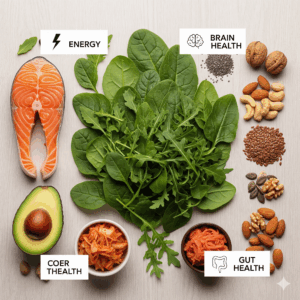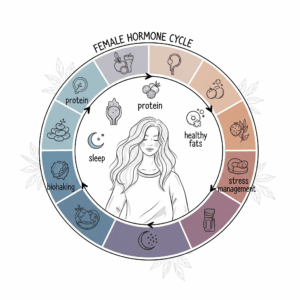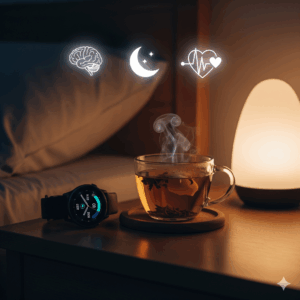What is Biohacking?
Biohacking is one of the fastest-growing trends in health and wellness, often described as the practice of making small, intentional changes to optimize the body and mind. Unlike fad diets or short-term solutions, biohacking focuses on measurable improvements over time. These changes can be as simple as adjusting what you eat or as advanced as using wearable technology, genetic testing, or supplements.
At its core, biohacking combines nutrition, science, and lifestyle changes to help people improve energy, focus, longevity, and overall performance. Many people use it to sleep better, manage stress, and boost productivity while supporting long-term health.
Biohacker Definition
A biohacker is someone who experiments with lifestyle modifications to improve mental and physical well-being. Biohackers rely on data-driven approaches—such as tracking sleep patterns, heart rate, or blood sugar levels—to make informed decisions about diet, exercise, and stress management.
The main goal is to understand your body better and continuously fine-tune habits to support health and performance.
Key Areas of Biohacking
Biohacking often spans several lifestyle areas, including:
-
Nutrition and Diet: Choosing foods that fuel energy and reduce inflammation.
-
Exercise and Movement: Building physical strength and endurance.
-
Sleep Optimization: Creating conditions for high-quality, restorative sleep.
-
Stress Management: Reducing mental and physical strain through mindfulness.
-
Supplements and Technology: Using tools and nutrients to enhance performance.
When these areas work together, they create a sustainable approach to wellness.
The Biohacking Diet
Food is at the center of biohacking. A biohacking diet is not a strict formula but a flexible approach designed to support individual needs. The focus is on nutrient-dense, whole foods that provide steady energy, support brain health, and reduce inflammation.
Common dietary practices among biohackers include:
-
Intermittent fasting to improve metabolism and mental clarity.
-
Low-carb or ketogenic diets for stable energy levels.
-
Plant-rich diets for antioxidants and gut health.
The diet adapts to a person’s lifestyle, energy demands, and goals. Tracking meals and noticing shifts in mood or energy help refine choices over time.
Foods That Support Biohacking
Certain foods are consistently part of a biohacking lifestyle:
-
Leafy greens and colorful vegetables – rich in vitamins and antioxidants.
-
Grass-fed meats and wild-caught fish – high in protein and omega-3s.
-
Nuts, seeds, and healthy fats – such as olive oil and avocado for brain health.
-
Fermented foods – like kimchi, yogurt, and sauerkraut to support gut health.
These foods help stabilize blood sugar, fuel energy, and reduce long-term health risks.
Biohacking Supplements
Supplements are widely used in biohacking to support areas where diet alone may not be enough. Popular options include:
-
Omega-3 fatty acids for brain and heart health.
-
Vitamin D to support immunity and mood.
-
Magnesium to promote relaxation and better sleep.
-
Adaptogens like ashwagandha to balance stress and energy.
However, supplements must be chosen carefully. Biohackers often rely on lab testing to identify deficiencies before adding new products.
Biohacking for Women
While biohacking benefits everyone, women often have unique health considerations due to hormonal cycles, fertility, pregnancy, and menopause. Biohacking for women emphasizes strategies that balance hormones, maintain energy, and support emotional well-being.
Key areas include:
-
Cycle tracking to understand hormonal changes and adjust lifestyle accordingly.
-
Balanced nutrition to stabilize blood sugar and reduce mood swings.
-
Stress reduction techniques to manage cortisol and protect hormonal balance.
By tailoring biohacking practices, women can improve focus, energy, and overall vitality.
Hormonal Health and Biohacking
Women’s hormones play a critical role in metabolism, mood, and overall wellness. Biohacking strategies for hormonal health often focus on:
-
Eating protein-rich meals for stable energy and muscle support.
-
Incorporating healthy fats to promote hormone production.
-
Avoiding excessive sugar and refined carbs to stabilize blood sugar.
This holistic approach reduces fatigue, supports fertility, and helps with mood regulation.
Stress, Sleep, and Recovery
Stress and poor sleep can be major obstacles to women’s health. Biohacking offers practical strategies for recovery and resilience:
-
Practicing mindfulness and deep breathing to calm the nervous system.
-
Using sleep trackers to monitor rest quality.
-
Reducing caffeine intake in the afternoon and evening.
-
Creating a nighttime routine that signals the body to wind down.
These habits improve energy and mental clarity during the day while building long-term resilience.
Benefits of Biohacking
When practiced safely, biohacking can deliver significant benefits:
-
Higher energy and productivity
-
Better sleep quality
-
Reduced stress levels
-
Improved focus and clarity
-
Increased awareness of personal health
Risks of Biohacking
Like any health practice, biohacking has risks if done without balance. Potential downsides include:
-
Overuse of supplements without proper testing
-
Following unproven or extreme practices
-
Ignoring medical guidance in favor of self-experimentation
Safe biohacking means doing research, making gradual changes, and consulting professionals when needed.
How to Start with Biohacking
The best way to begin biohacking is by taking small, manageable steps. Examples include:
-
Tracking sleep patterns with a journal or wearable device.
-
Making one meal healthier each day.
-
Adding short daily walks or light exercise.
-
Practicing mindfulness or meditation for stress relief.
Over time, you can layer in more advanced practices like intermittent fasting, supplements, or genetic testing. The key is consistency—not quick fixes.
Final Thoughts
Biohacking is ultimately about self-awareness and control. By experimenting with nutrition, movement, and recovery, you can create a lifestyle that supports long-term well-being. For women, tailoring biohacking practices to hormonal and lifestyle needs makes the journey even more effective.
The future of wellness is not about chasing quick solutions—it’s about learning how your body works and making informed, sustainable choices.
👉 For more insights on health, wellness, and innovation, read IMPAAKT, the top business magazine trusted by global leaders.














